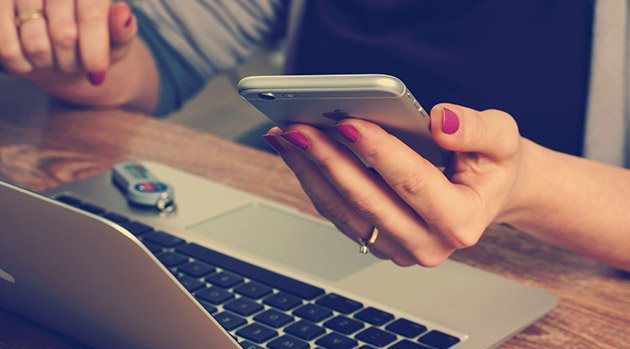Overcome Technology Addiction

Technology is a wonderful thing, and smartphones and tablets have brought the world to our fingertips like never before. We are able to stay in touch with people on the other side of the globe, find out news and information easier than ever, and enjoy a wealth of entertainment.
The flip side to this, is that our personal relationships are suffering, our attention spans are diminishing (from around 12 seconds in 2000, to around eight seconds by 2018)[1] and despite all the thumbs up and hearts that we are receiving online, we are not getting happier as a result. As with everything, moderation is the key. Follow my steps to overcome technology addiction. Take control of your gadgets, rather than letting them be in control of you!
Read the signs
Symptoms of technology addiction are hard to spot, as our use of smartphones and social media has been gradually increasing. The average person checks their phone every 15 minutes, even without notifications! Anxiety, tension, problems with distance vision and pain from poor posture can often be attributed to the overuse of technology.
Be aware
It may seem counter-productive, but can be useful to download an app that monitors your screen usage. You may find that you are shocked at the time spent on your smartphone. As with all addictions, self-awareness is an important part of the recovery process, and once you see how much time is spent staring at your screens, it can be the wake up call that you need to make changes.

Lead by example
Young people are particularly vulnerable to technology addiction, and social media means that any problems they may be facing at school can continue at home. Make your home a sanctuary. Have a ‘tech amnesty’ and hand your mobile phones in at the door when you get home, even only for an hour or two. Designate areas of your home as tech free zones, such as the sofa, the dining table, and especially the beds! Encourage everyone to turn off their phones at night, preferably leaving them in an unoccupied room, or at least in a drawer. The light from screens is proven to disrupt healthy sleep patterns, so turning them off an hour or so before bed has more than one benefit.
Go analogue
Set yourself an analogue challenge, and see how tech free you can go! Use a paper diary to plan your days, write in a traditional journal with a pen. Read real books (not e-books) and write postcards or letters to let people know that you are thinking of them. Writing with a pen lights up different pathways in our brains, stimulating memory and creating a real connection with the present moment.
Get back to nature
One of the best things that we can do to break technology addiction, is to get back to nature. Taking a walk, going to the beach, working in the garden, all form a connection with the earth that cannot be replicated in an online world. Consider having a very basic emergency mobile phone without internet connection for when you are out. This way, people can still contact you in a genuine emergency, but you are totally connected to the real world, rather than distracted by constant notifications.

The work dilemma
Breaking from technology addiction can be an extra challenge if you use smartphones or tablets for work. Unless your business is dependent on emergency call out work, you should still be able to step away from your tech for a few hours each day. If you use social media for business, plan a five minute check every two hours. Try using social media scheduling to add posts, to avoid being connected all of the time!
Be in the moment
How often have you gone to a concert or live event, only to be distracted by screens as people try to take photographs? (Even when artists have asked the audience not to do so!) There is a real magic when you turn off the tech and just enjoy an experience. Watching your favourite song playing back on a tiny screen, with low lighting, shaky camera work and dodgy sound is no substitute for creating a natural memory in your mind.
One of the many problems with technology is that we withdraw from real world situations in favour of an online social life. Make an effort to see people in real life, and talk face to face rather than via an app. Give your friends and family the attention that they deserve, rather than more clicks on a stranger’s cat video! If you are out with friends, try to resist the urge to look at your phone, even if you are left alone for a few minutes. Amazing things can happen when we look up!
Please feel free to post a comment below.
All the best,
Glenn
P.S. My hypnotherapy / hypnosis recordings can help you with addictions of any kind. Download these recordings now! These titles are also available as iPhone, iPad and Android apps. Download these recordings now!
References
[1] The Telegraph 12/03/2016







Thanks for sharing the article. Friends and family support is very important during recovery. It can help to motivate the person to recover with their addiction.